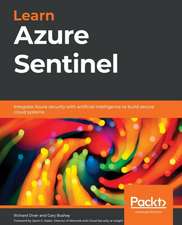Artificial Intelligence: Its Philosophy and Neural Context: Routledge Library Editions: Artificial Intelligence
Autor F. H. Georgeen Limba Engleză Hardback – 14 mai 2018
| Toate formatele și edițiile | Preț | Express |
|---|---|---|
| Paperback (1) | 323.23 lei 6-8 săpt. | |
| Taylor & Francis – 6 mai 2020 | 323.23 lei 6-8 săpt. | |
| Hardback (1) | 625.03 lei 6-8 săpt. | |
| Taylor & Francis – 14 mai 2018 | 625.03 lei 6-8 săpt. |
Preț: 625.03 lei
Preț vechi: 942.63 lei
-34% Nou
Puncte Express: 938
Preț estimativ în valută:
119.60€ • 124.87$ • 98.98£
119.60€ • 124.87$ • 98.98£
Carte tipărită la comandă
Livrare economică 04-18 aprilie
Preluare comenzi: 021 569.72.76
Specificații
ISBN-13: 9780815363361
ISBN-10: 0815363362
Pagini: 234
Dimensiuni: 156 x 234 x 12 mm
Greutate: 0.45 kg
Ediția:1
Editura: Taylor & Francis
Colecția Routledge
Seria Routledge Library Editions: Artificial Intelligence
Locul publicării:Oxford, United Kingdom
ISBN-10: 0815363362
Pagini: 234
Dimensiuni: 156 x 234 x 12 mm
Greutate: 0.45 kg
Ediția:1
Editura: Taylor & Francis
Colecția Routledge
Seria Routledge Library Editions: Artificial Intelligence
Locul publicării:Oxford, United Kingdom
Public țintă
Postgraduate, Professional, and UndergraduateCuprins
Preface. Book 1: The Basic Issues of Information Technology 1. The Nature of the Problem 2. Some Preliminaries 3. Model Making Book 2: Artificial Intelligence 4. Vision and Perception 5. Learning, Problem Solving and Thinking 6. Language 7. Logic, Inference Making and Theorem-Proving 8. Knowledge-Based Systems. References. Index.
Descriere
Originally published in 1986, in order to probe, dispute and analyse the role of artificial intelligence in cybernetic thought and information science, the author pursues this topic within its philosophical, behavioral and neurophysiological contexts, while drawing attention to cognitive issues.

































